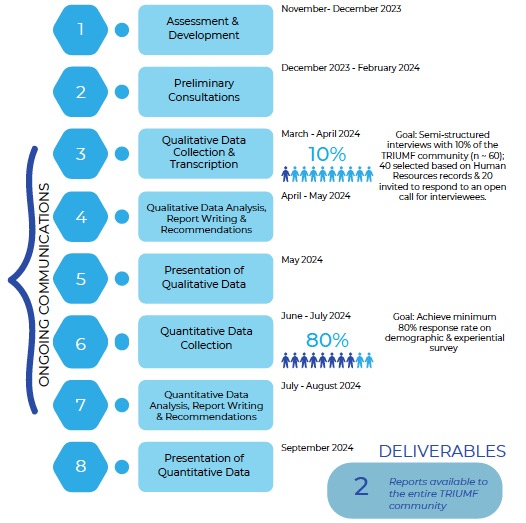How much do you know about who works and studies at TRIUMF? How about peoples' attitudes and experiences when it comes to EDI at TRIUMF?
To answer these questions, we need the help of the entire TRIUMF community. The first step towards building a truly diverse and inclusive community is to understand people’s identities and their experiences and benchmark them as the TRIUMF workplace evolves.
For several months, TRIUMF's Equity, Diversity, and Inclusion (EDI) Committee (EDIC) and Early Career Scientist EDI Committee (SCS-EDI) has been working with a third-party research group, the Laurier Centre for Women in Science (WinS) - represented by Dr. Eden Hennessey - to conduct a suite of EDI assessment work at TRIUMF. All information will be treated with care and confidentiality throughout the entire process.
The upcoming EDI Assessment Work will be comprised of two main components:
- Phase I: In-person interviews (Mar 24-28, 2024) - qualitative data collection
- Phase II: Online survey (Jun/Jul 2024) - quantitative data collection
Phase I of the work (interviews) will provide a foundation for Phase II (organization-wide survey). All information will be handled by WinS and treated with care and confidentiality throughout the entire process. The goal of this work is to ensure that everyone at TRIUMF is included in the upcoming interviews or in the survey.
Timeline

Data collected in both phases of the assessment work:
- Inform institutional decisions that will impact the entire community
- Be useful to students and employees by validating personal experiences
- Highlight gaps in demographic representation and experience
- Provide evidence that can be used in hiring and promotion decisions

Dr. Eden Hennessey
Department of Psychology, Equity, Diversity, and Inclusion (EDI) Data Specialist, Office of the Associate Vice President, Equity, Diversity, and Inclusion, Wilfrid Laurier University
Dr. Eden Hennessey is a social psychologist who researches and mobilizes knowledge related to diversity promotion and discrimination reduction. Her most recent work assesses the consequences of confronting gender bias in Science, Technology, Engineering and Math (STEM). Eden advocates for equity and inclusion on university campuses, and combines arts with data to impact world-wide audiences. She is deeply committed to her work as the Manager of the Student Centre for Equity, Diversity, and Inclusion at Wilfrid Laurier University and as the Research and Programs Director of the Laurier Centre for Women in Science (WinS).
It is critical to gain your perspectives during this process. If you have any questions, please refer to the below FAQ or reach out to us at Equity, Diversity & Inclusion Committee with a subject line "EDI Assessment Work".
WinS Office Hours at TRIUMF
March 19th, 12 PM - 1 PM PST: Teams link
April 5th, 9 AM - 10 AM PST: Teams link
April 16th, 12 PM - 1 PM PST: Teams link
May 3rd, 9 AM - 10 AM PST: Teams link
May 14th, 12 PM - 1 PM PST: Teams link
June 7th, 9 AM - 10 AM PST: Teams link
FAQ
1. What is WinS?
The Laurier Centre for Women in Science (WinS) is a research centre formed in 2012 located at Wilfrid Laurier University in Waterloo, Ontario, Canada. WinS is comprised of scientists and social scientists interested in exploring and assessing the scientific context, one aspect of which is organizational culture or climate (i.e., environmental factors that influence the space, place, and experiences of employees, researchers, and all stakeholders; Abu-Jarad et al., 2010; Chatham & O’Reilly, 2016). Researchers at WinS are trained in areas such as social psychology, natural sciences, education, and science communication. WinS is well-positioned to identify and navigate complex social issues related to equity, diversity, and inclusion (EDI) in science. WinS researchers are trained in ethical study design and data collection, and our work takes an intersectional lens, considering all facets of identity (e.g., gender, race, sexual orientation). We are passionate about providing a data-driven approach to program evaluation, scientific work, and providing organizations with practical recommendations. WinS has worked with the Canadian Museum of Science and Technology, Ingenium Canada, the Natural Sciences and Engineering Research Council of Canada (NSERC), and the Canadian Commission for United Nations Educational, Scientific, and Cultural Organization (CCUNESCO), Canadian Science Publishing, Canadian Association of Physicists, Toronto Metropolitan University, and the Perimeter Institute for Theoretical Physics.
2. Why should I talk to WinS?
Talking with WinS can be thought of as the first step in the process of creating a comprehensive understanding of who people at TRIUMF are and what they experience, so that any actions undertaken by TRIUMF are evidence-based rather than speculative. We all engage in assessments in our daily lives; for example, when we take our vehicles to the mechanic, or when we go to the doctor to get a diagnosis and treatment. Talking with WinS or participating in the survey is a necessary part of assessing TRIUMF’s overall organizational health. It can be difficult to talk about certain aspects of our lives. However, without information about who you are and what you think and experience, it is difficult to understand and meet your needs. WinS researchers are trained in receiving disclosures of personal harm, and will work with TRIUMF to ensure the safety of all participants.
3. What will WinS ask me?
There are two ways for you to be represented in the data collected by WinS. The first is through a series of semi-structured interviews planned for Winter 2024. In these interviews, you will be asked to fill out a quick survey to confirm that we have recruited a demographically diverse sample. Then, you will be asked 3-4 questions about your experiences and perceptions in a one-on-one conversation with the lead researcher from WinS, Dr. Eden Hennessey. The second way to be represented is through a survey, comprised of two main sections, planned for Summer 2024, and accessible to the entire TRIUMF community. The opening section of the survey will be a detailed demographic questionnaire that you will have the option to share with Human Resources. TRIUMF will not have access to the raw data, unless you provide consent for these records to be populated on WorkDay. The subsequent section of the survey will gauge your perceptions of factors like equitable reward and recognition, belongingness and inclusion, and identity-related experiences. Again, you can choose to leave any question blank, and your responses will not be tied to your individual identity in any reports or presentations.
4. How are the interviewees selected? What happens with interview data?
Interviewees will be selected using a careful process using available data from Human Resources, such as job area, compensation level, length of employment, and job title. This sampling technique is referred to a purposeful sampling (see Palinkas et al., 2015). Additional demographic variables will also be considered given the focus of the assessment is on inclusion, however, this data is limited (i.e., gender, race, nationality). To address this limitation, WinS, the EDIC, and ECS-EDI are collaborating to create an open call for those wishing to participate in interviews (i.e., 40 people will be invited based on Human Resources records, 20 spots will be open for volunteer interviewees). Interview data will be transcribed, anonymized, analysed for themes, and quantified in a report that will be presented to the TRIUMF community.
5. What is the role of the EDIC and ESC-EDI in this process?
Both the EDIC and ECS-EDI are important stakeholders in the ongoing work with WinS, providing useful insights based on their experience and knowledge of working in the EDI portfolio at TRIUMF. They are being consulted at every stage of the assessment, while also maintaining arm’s length distance from the data to preserve confidentiality and privacy.
6. What is the role of executive leadership in this process?
Executive and senior leadership are engaging with WinS throughout this process so that all members of the community are kept informed about strategic decisions and directions. WinS will provide a series of recommendations to leadership based on qualitative and quantitative data.
7. What happens with my information from the interviews or the survey?
The information from the interviews and surveys will be collected and stewarded securely by WinS. Interview data will be recorded, transcribed, and anonymized prior to any analysis or sharing of findings with the TRIUMF community. Survey data will be recorded using an online survey software program and stored on password protected devices owned by WinS. Survey data will be analysed using inferential and descriptive statistics, compiled into a report that will be presented to the TRIUMF community.
8. What is the point of this assessment?
TRIUMF has recognized the importance of access, equity, and inclusion as core values. There are a few different goals of this assessment, including: 1) A qualitative assessment of perceptions and experiences of those studying and working at TRIUMF, conducted through semi-structured interviews; 2) A demographic portfolio of those studying and working at TRIUMF, developed through a survey of identities; 3) A quantitative assessment of perceptions and experiences of those studying and working at TRIUMF, conducted through an online survey; and 4) A series of actionable recommendations for the TRIUMF community, informed by qualitative and quantitative research findings.
9. Why is my participation important?
Your participation is important because you know yourself and your experiences best. It is therefore critical that you participate in this process so that your identity and perspectives are represented as TRIUMF determines future actions. There is no TR__MF without U and I.
10. How will I be protected?
Your safety and privacy are of paramount importance. At every step of the process, WinS and TRIUMF have embedded mechanisms to keep your information confidential. Here are a few examples: 1) You can omit answers to any questions you choose in interviews and surveys; 2) Data is not accessible to TRIUMF directly, but is collected and stewarded by WinS, who provide high-level aggregate findings; and 3) Identifying information will be removed from any quotations in presentations and reports
